At Edicoop Cooperative Building of San Pedro Montes de Oca a forum was started under the motto «THE GREAT TURN OF HUMANITY IS IN OUR HANDS» which brought together people and organizations around the topics listed below.
The event was inaugurated by the international marchers of the World March Pedro Arrojo, Sandro Ciani, Juan Gómez and Rafael de la Rubia who sintered their route through 16 countries, 54 cities and dozens of activities in the 57 days of travel.
They stood out from among the central themes of the World March, the problem of violence against women, economic inequality and problems with the environment (pollution, lack of water quality and climate change).
A first Latin American March for the 2021 was also proposed.
The morning ended with some musical pieces by the peace-building singer-songwriter Santi Montoya very celebrated by the contestants.
From neoliberalism, towards a humanist economy
In the early afternoon the discussion was held: «From neoliberalism, towards a humanist, supportive, inclusive, cooperative and nonviolent economy".
It was in charge of Dulce Umanzor, Jose Rafael Quesada, Gustavo Fernández, Rafael López and Eva Carazo, all of Costa Rica who gave a critical vision of the neoliberal economic model that Costa Rica has addressed without effectively responding to all sectors of the population.
Development alternatives were exposed, in the face of prevailing economic violence, with communal forms of organization, with the support of interdisciplinary networks, or more formal cooperatives, but which by their nature promote the distribution of wealth rather than the concentration of capital in less hands, as well as the informal, creative and solidarity economy that has historically existed in humanity.
They opened proposals to advance in each of these fields, betting on deepening and strengthening the role that Costa Rica has played as a vanguard country in human rights, inclusion of discriminated sectors, solidarity, peace and education policies in the region.
The presentations were made with concrete examples made and launched in Costa Rica, however each proposal presented could be applied perfectly to any place in Latin America, so they are delivered as part of the enunciations of this Forum and of this 2 World March, wanting Give your contribution to the fight against poverty, discrimination and the exclusion of vast layers of the population in our region.
Rafael López
He addressed the issue from the Experiences of the Community Social Dialogue Tables as builders of local development, towards a culture of peace and active nonviolence.
First analyzing the current crisis of the communal movement and the possible causes of low citizen participation and especially the new generations.
Then he proposed a vision and a methodology of communal work, through the dialogue tables, in which the articulated, horizontal and solidarity participation of neighbors, community leaders, officials of institutions, companies, local university management, as well as civil organizations and Religious according to the real experiences registered by the UNED.
It concludes by urging to strengthen community action through the methodological approach of social networks, proposed by the dialogue tables, trying to build goals and shared activities, guided by action-reflection-action. To actively influence joint local development.
Gustavo Fernandez
He gives us his presentation «The cooperative model to create a culture of peace«.
Indicating how the cooperative model is inspired by humanistic principles and values, since it is a form of democratic organization that promotes social peace and joint work, constituting a non-profit company, where wealth must be distributed among its associates and not concentrated as in the capitalist model.
He explained how currently in the economy two sectors are clearly identified, the Public Sector and the Private Sector.
However, there is a Third Sector which is made up of associations, this sector, together with the other two mentioned, can be linked to give rise to a social solidarity economy, where cooperatives that have an associative base are located.
In Costa Rica, cooperatives have been generating economic development and social mobilization. There are close to 900 cooperatives and 887000 associates, thus being a great contributor to social peace.
Sweet Umanzor
With his presentation: “ Nonviolence as a tool to achieve equal opportunities for women in cooperativism”, It expands and reinforces the importance of cooperativism in Costa Rica, as a different way of doing business.
However, according to Umanzor, women have been discriminated against in the cooperative movement.
So it is essential to give full participation to women in membership and in the management of cooperative structures in a percentage of at least 50%.
As indicated, the management positions in the cooperative dome are occupied by men at 77%.
In the 2011 the national committee for gender equity in cooperativism, presented a bill to regulate such participation, however, it was not approved.
There is a new bill that will be convened very soon, it is necessary to assume in the cooperative law, a set of international legal mandates that our country acquired to avoid all types of discrimination against women, so that cooperative women urge all citizens to implement concrete equality plans concluded Ms. Dulce Umanzor.
Eva Carazo
Continuing with the conversation, he exposes us about the social solidarity economy, as a cultural practice of the human being that has historically existed and that places people, their work and common welfare as a center, not as in the neo-liberalism that focuses on the individual, selfish and cumulative capital benefit.
He also points out that neoliberalism produces several types of violence by generating exclusion of sectors, for example that of women with gender violence.
Another is environmental violence due to indiscriminate exploitation of natural resources, for example the impact on the environment, through the use of agrochemicals, which occurs in pineapple production in Costa Rica.
As well as cultural violence, normalizing unrestrained consumption practices and individualism, imposing roles and generating inequalities towards women in the treatment and valuation of their work compared to that of men.
There are collective, creative, solidarity alternatives some without being legally registered, many informal but articulated with horizontal forms of organization, where all work is recognized and needs are met in a sustainable way with the environment and with values, principles and practices that give alternatives of development in the country and that should be strengthened, through solidarity economy courses, aimed at peasant sectors, environmentalists, women, etc.
In addition, meetings, fairs, generation of platforms for alternative economies and promoting solidarity when consuming, concludes Carazo.
José Rafael Quesada, ends the conversation
With the Dilemma of the Local, it exposes the problems faced by a local government to generate economy in a given territory.
On the one hand there is the world bank with its policies to discourage small businesses by oppressing it, to boost and maintain concentration in less hands of big capital.
On the other, we find the national productive context and the context of institutional crisis, bureaucracy and government policies that reduce available resources.
We also encounter the generation of poverty in a system in which unemployment increases and in which technology is not at the service of human beings.
That is why, as Don José tells us, a humanistic approach to the economy must be given, where the human being is the central value and work takes into account the social, economic and environmental aspects in a balanced way, so that we really have a development sustainable.
He also shares some experiences in micro economics that have given concrete solutions through research, innovation and the development of ideas to generate new businesses, such as the Beekeeping Industry, the Chumico industry, the Pithaya Industry, among others.
Finally, it leaves us with another possible solution as a counterpart to the neoliberal model, this being the Universal Basic Income, which is a periodic income paid by the State to each citizen belonging to that community as a right of citizenship, without any conditions.
Proposals for the construction of peace and social advancement
The Forum continued with the Conversation: “Proposals for the construction of peace and social advancement in Latin America. The necessary UN Refoundation. The role of the OAS and armies in this 21st century".
In this table we have the participation of Messrs. Trino Barrantes Araya (Costa Rica), Francisco Cordero Gené (Costa Rica), Rafael de la Rubia (Spain) and Juan Gómez (Chile).
Trino Barrantes
He exposes us how the OAS since its inception became a defender of the geopolitical, strategic and military interests of the United States, however it would be necessary to readjust its objectives so that it really is an international organization in favor of peace, nonviolence and democracy and function as a barrier against despotic, tyrannical or fascist governments.
But this aspiration has been far from being fulfilled, since the OAS has historically lacked political will in decision making and its role has been conditioned to the logic of the neoliberal market and to the service of the United States military interests .
And this has been demonstrated in multiple conflicts in which the OAS has remained silent, in obvious complicity with the country of the North, said Barrantes.
Later, he cites several examples to illustrate what has been stated above, from the mercenary invasions to Cuba in 1961, the occupation by the US army against the Dominican Republic in 1965, to silence against the interference policies of the LIMA group and as far as To the brutal repression against unarmed civilians in Ecuador and Chile, all this prolonged inaction and muteness, makes us think if the OAS could be an objective and impartial arbitrator in the audit of the elections in Bolivia on October 20 ?. The facts showed that before and after the coup against Evo Morales, the OAS was on the side of the coup plotters, concludes Don Trino.
Francisco Cordero Gené
With his presentation “Contradictions of Drug Trafficking and a proposal to achieve peace in the war on drugs”Analyzes how the intelligence of the United States takes advantage of drug addiction, the expansion of the illegal market and the control of the political apparatus to legitimize its armed presence in Costa Rican soils and seas.
While reversing the process of demilitarization in Costa Rica, with the excuse of maintaining a war that, as indicated, protected by the world drug report of the 2018, we have been losing for years, as psychoactive substance markets continue to rise, to although it has never been spent as much as today, on weapons, training and specialized security forces.
Not to mention the agreement that Costa Rica has with the United States of the “Joint Patrolling” where the entry of troops and ships of the Coast Guard is authorized, subordinating our police actions and undermining our sovereignty, said the Lamb.
Finally, it launches a proposal to the 2 World March so that the issues of prohibition policies and the "War on drugs" are incorporated into the agenda of this commendable international initiative, delivering in its presentation several points of analysis among other programs of prevention and treatment of addicts, as well as the controlled legalization of the drug before the prohibition and repression of consumers.
Juan Gomez
He told us about militarism, armamentism and the environment.
The military industry is generating large greenhouse gas emissions, its production is highly polluting affecting the environment, soil and water effluents.
Additionally, wars devastate the flora and fauna of the combat front, leaving the land unusable for decades, not to mention the explosive waste they leave as mines and bomblets, said Gomez. On the other hand, wars, in addition to producing instability in the region where they originate, generate massive migrations and foster international tensions.
So, according to the exhibitor's vision, The future of armies should be an institution in tune with the environment, collaborating in the prevention of damage caused by disasters by planning actions with citizens, carrying out rescue actions and integrating joint regional actions. In this sense, the military should have training for the service of their people, concluded Gomez.
Rafael of the Rubia
In reference to the armies, he highlighted a novel point of view, which is part of the proposals of the 2 World March, referring to a conversation he had with a high general of NATO, who has collaborated in activities of World Without Wars, in the one that said that the function of the military would be to prevent war, to create the conditions so that the phenomenon of war does not occur, that would be the new paradigm of the armies.
He also told us about the incongruity in the case of Europe, which is a European union, for decades and yet maintains 27 armies, supposedly to defend each other.
This makes no sense today. He highlighted the proposal of the Refoundation of the United Nations proposing two new security councils: a Social one (that eliminates hunger and basic living conditions in the world) and another Environmental (that monitors attacks on nature and watches over a world sustainable).
The Forum continued for one more day
The Forum continued for one more day, the November 28.
Being this day, the one of the proposals of this 2ª World March to open spaces of diffusion of the themes of nonviolence in all its manifestations, as much to the new generations, as the educational centers, universities and the community in general. As well as to encourage the visibility of the positive actions that are carried out day by day in our societies.
So we started with the Workshop open to the public of "New Spirituality and Nonviolence", by Saul Asejo (Chile), Fernando Ayala (Mexico) and Lorena Delgado (Costa Rica).
With an approach from the Communities of the Silo Message which support the 2 World March, there is an aspiration to build nonviolent spaces based on the principles of valid action and through spirituality.
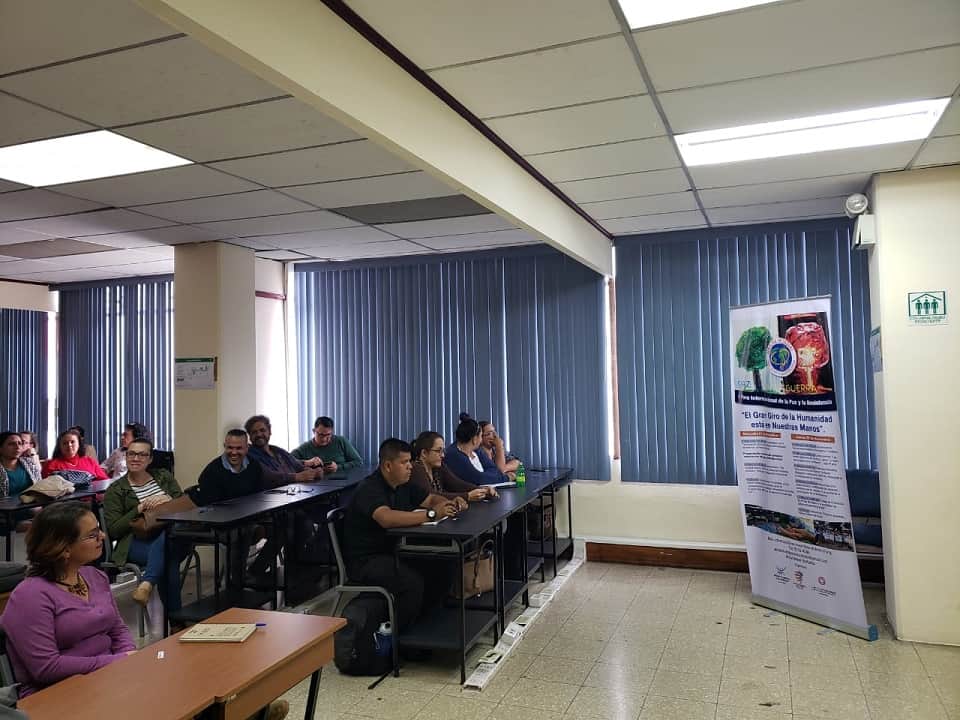
Later, we continue with the discussion “Visibilizing positive actions” by Mercedes Hidalgo and Pablo Murillo of the Council of the Young Person, Rafael Marín of the Civic Center for Peace of Heredia and Juan Carlos Chavarría, of the Transformation Foundation in violent times .
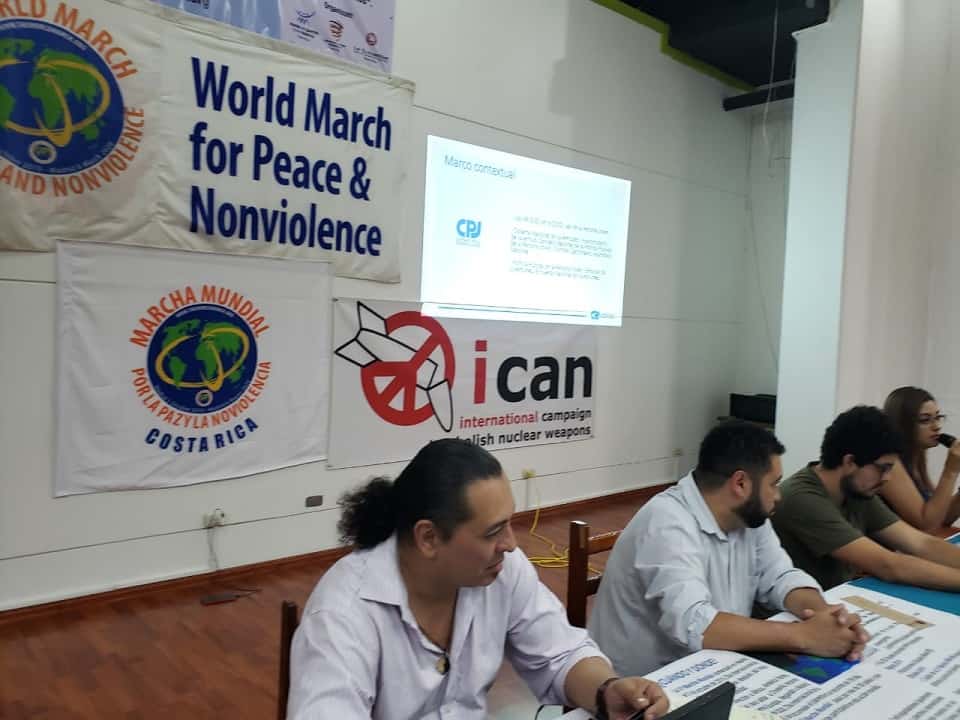
Rafael Marín
It exposes us about the Civic Centers for Peace program, the nature of the program and the actors involved in it.
As well as the methodology used; the participation of inter-institutional work to implement art, sports and recreation as an alternative for violence prevention.
And finally, it summarizes positive experiences throughout the work done.
Mercedes Hidalgo and Pablo Murillo
We present the experiences from the implementation of programs through the Council of the Young Person, in two different communities, Santa Cruz de Guanacaste and Heredia, through the promotion of the culture of peace.
The work is designed taking into account the specific needs of each community and programs focused on young populations at social risk are developed, seeking to promote their participation in the search for opportunities to improve and strengthen their quality of life.
Juan Carlos Chavarría
He exposes us as from the Foundation that presides and generating links with volunteers in different branches, they have managed to take a proposal to many people who for various reasons are deprived of liberty, and to young people from communities of high social risk such as Carpio, so that Through art as a tool for social change, it is possible to rescue and transform children, youth and children deprived of freedom from difficult environments that corrupt them and lead to violence.
Finally, the Forum concludes with two keynote lectures both delivered by specialists each in their field of two topics of crucial importance for the objectives of this 2 World March:
Dr. Carlos Umaña, ICAN representative
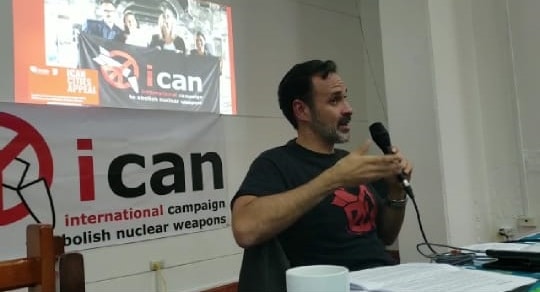
By Dr. Carlos Umaña, representative of ICAN, Nobel Peace Prize winner 2017.
He gave us a very enlightening talk full of data and records about the consequences of the use and manufacture of nuclear weapons.
"Worldwide $116.000.000.000 is spent a year on nuclear weapons, this budget is similar to that required by the SDGs to provide public education, health and basic food to the entire planetary population," said Umaña.
Further on, we outline a series of actions that we can carry out as a civil society, to fight against nuclear weapons (AN).
For example, do not invest in banks that finance nuclear bombs. Require your local government to invest public funds responsibly, outside of financial institutions related to NA
On the other hand, the targets of the AN are the cities and they can pressure the central governments to support the nuclear weapons prohibition treaty (TPAN).
We must get involved, change depends on us, we must imagine a possible world without nuclear weapons, concluded Dr. Umaña.
"Environmental Violence and New Water Culture", Dr. Pedro Arrojo
"Environmental Violence and New Water Culture", by Dr. Pedro Arrojo, Deputy in Spain for Podemos, University Professor and Goldman Environmental Prize in the Europe category
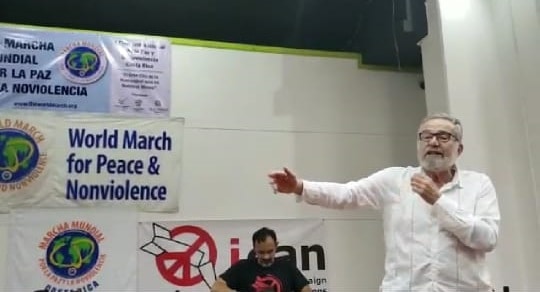
Dr. Arrojo, gave an eloquent class, explaining first how pollution is the real key problem of the global water crisis.
"It is said that 1000 million people do not have access to guaranteed drinking water and as a consequence, 10,000 deaths per day are estimated for this cause." We can identify the main causes of this water contamination in the use of agrochemicals, agrochemicals and by the action of heavy metals, highlighted Don Pedro.
However, all countries can recover the health of ecosystems. Failure to do so is a priority problem.
The water issue is too complex to entrust to the market
The issue of water is too complex in its functional multiplicity to entrust it to the market.
This is why Dr. Arrojo proposed several years ago, as he indicated, an ethical categorization of water; which is the following:
Water life: Vital and free as a human right.
Water citizenship: Water at home with citizen rights and duties. As a public service.
Water Economy: The one needed in a factory to produce or irrigate agriculture. Requires differentiated rate.
Water Crime: Water used for activities that are illegitimate and must be illegal (eg open pit mining).
The importance of water is not its physical immateriality, but what it is used for, concludes Don Pedro.
We conclude the Forum
We have concluded with great satisfaction this ambitious Forum that wanted to cover the central themes of the 2 World March, intending to collaborate in the initiation and strengthening of initiatives and relationships between organizations and institutions in the fields of the development of a culture of peace and nonviolence.
We hope that your conclusions and resolutions can be used to be collected by this 2 World March and directed at larger instances, with concrete proposals for necessary changes in the direction of that Great Turn that we all want for humanity and that only by working together can we reach. The time has come to take it in our hands.
We appreciate the support with the dissemination of the web and social networks of the 2 World March
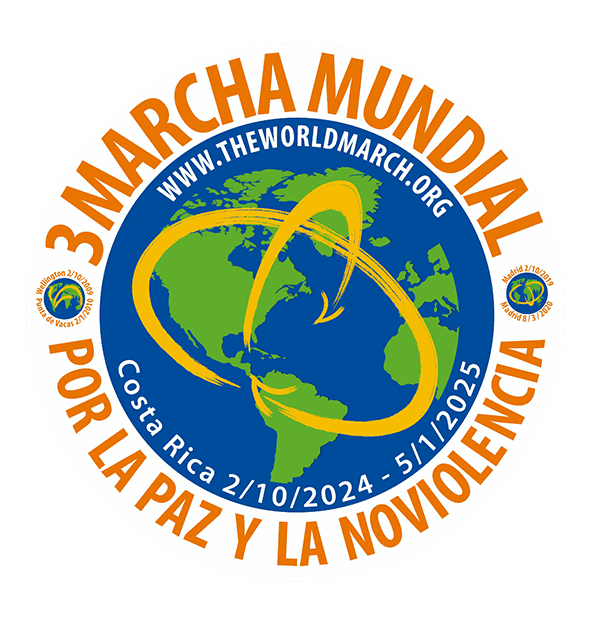
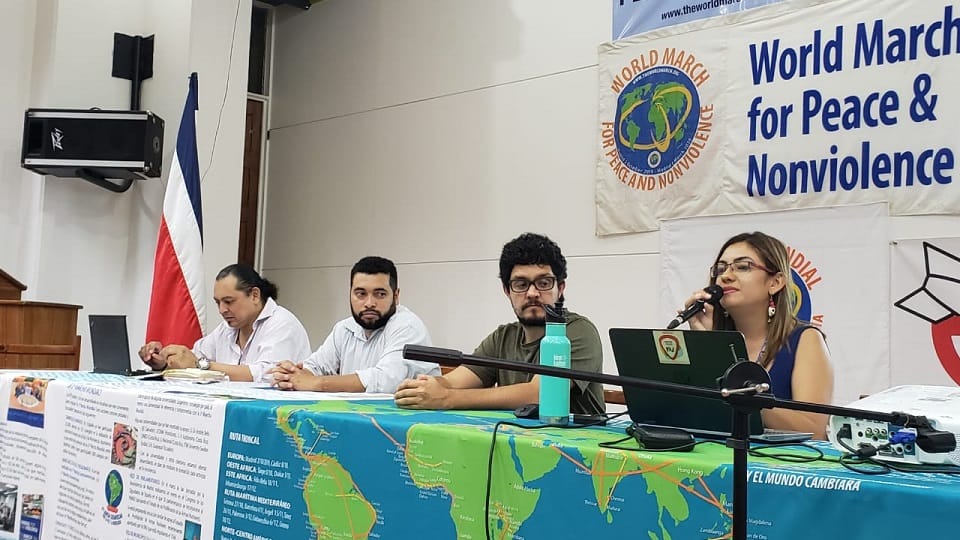


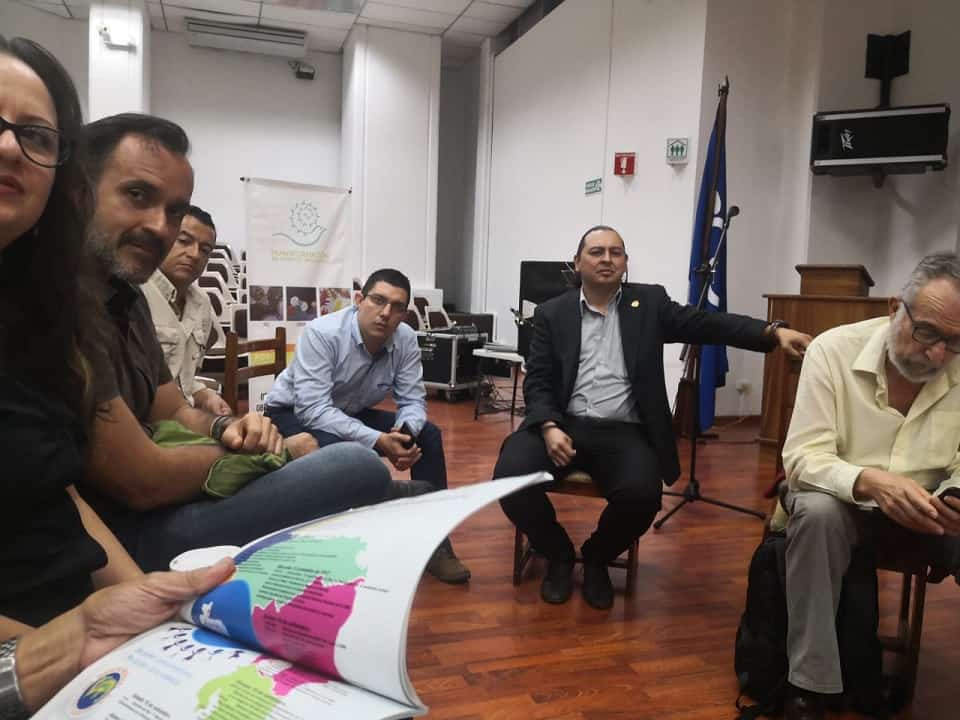
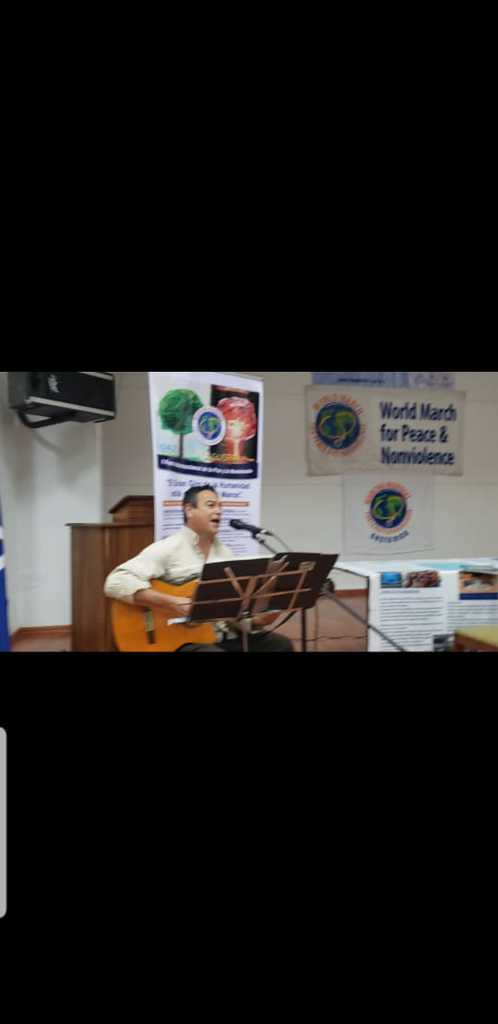
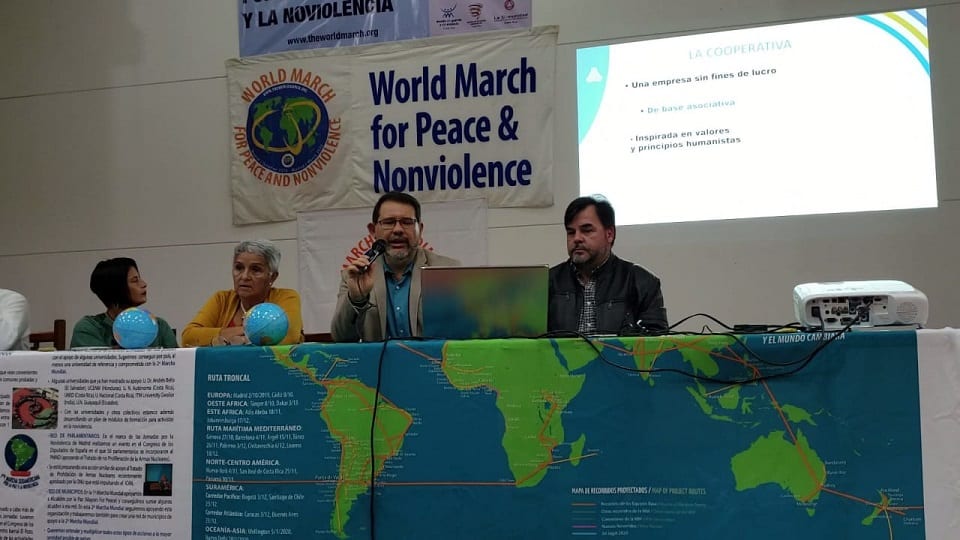
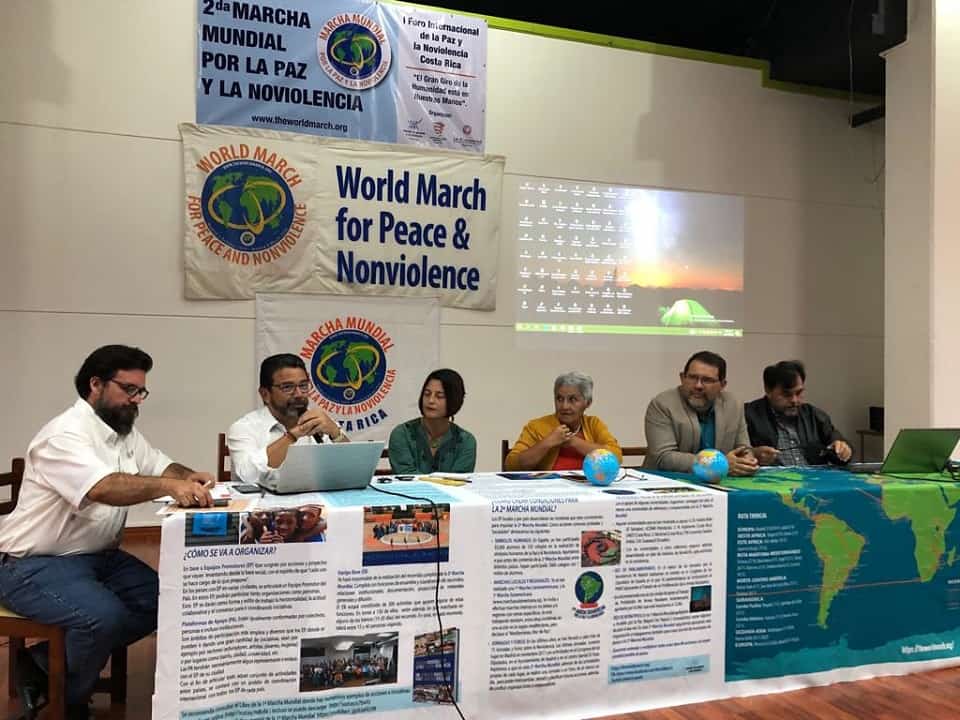


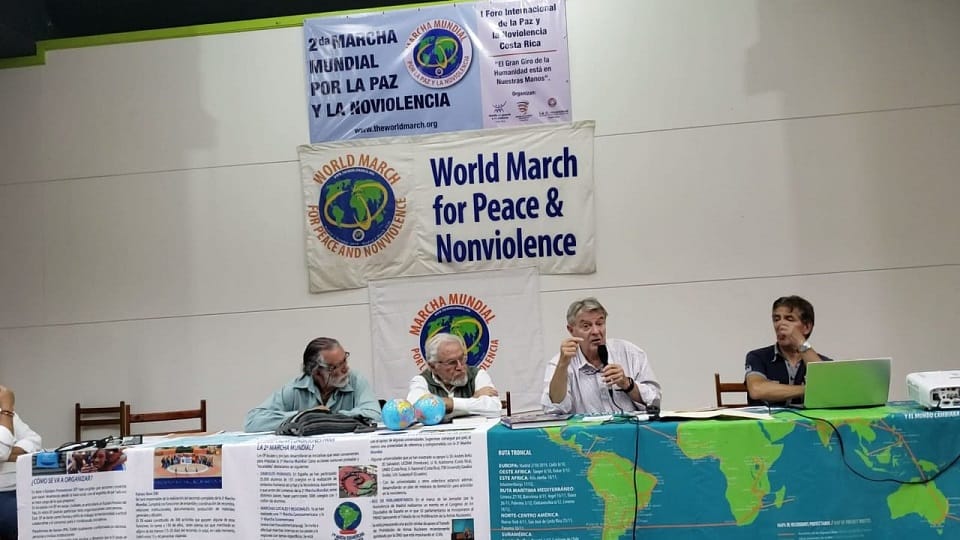
2 comments on "International Forum for Peace and Nonviolence"